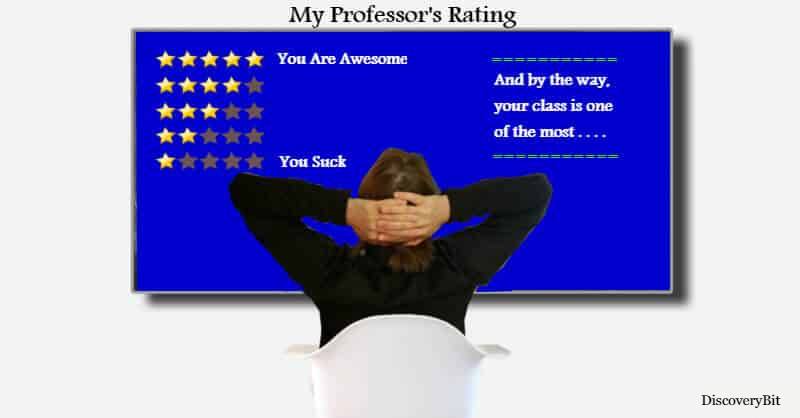Welcome to the twists and turns of academia – where highly-rated heroes on Rate My Professors might surprise you as academic villains, and the poorly-rated ones could turn out to be the unexpected saviors that infuse passion and uniqueness to aid you to excel during your academic pursuit.
Imagine daydreaming in class, only to be snapped awake by a highly-rated professor criticizing your posture as “boring”? Suddenly, crossing your arms feels like a crime, and you start to question if you accidentally signed up for a comedy show instead of a lecture. We’ve all been there – encountering the puzzle of highly-rated professors turning into villains and low-rated ones becoming the unexpected heroes.
Given scenarios like these, and recognizing that professors can shape your success, how do you ensure you don’t end up with a professor who makes your college experience feel like a circus?
Well, the key lies in understanding what makes a great professor and how to forge a strong connection with them; it might just be one of the most critical keys to unlocking success in your college career.
In this regard, getting to know your professors better may involve researching them on Rate My Professors – the online platform where students can rate and share their experiences. From passionate instructors to those overwhelming you with excessive workloads, Rate My Professors may reveal the truth behind the academic scene. However, effectively navigating the reviews is crucial in choosing the right guides for your academic journey.
So, join us as we explore the world of professor evaluations, with insights from academic contributors. Let’s kick things off with a couple of interesting review types on the Rate My Professors platform!
A) What are some of the Rate My Professors platform FAQs?
|Answer |
B) Who are the contributors to this Rate My Professors post?
|Answer|
Review Types On The Rate My Professors Platform
Online platforms like Rate My Professors, in the constantly changing world of academia, serve as a platform for students to share their experiences and perceptions about the quality of teaching they receive. These reviews are a melting pot of emotions that range from, for example, admiration for exceptional teaching to frustration over tedious lectures. They showcase the best and worst of the educational experience. Let’s begin with some of the common positive review types.
 Positive Reviews:
Positive Reviews:
1) Professor Hilarity Hub: Students often admire professors who incorporate humor into their lectures. Whether through witty anecdotes or clever jokes, the laughter-filled classrooms create memorable learning experiences. These professors often receive rave reviews on the Rate My Professors platform for turning the lecture hall into a fun comedy club.
2) Eccentric Teaching Methods: Professors who depart from conventional teaching methods, for example, from interpretative dance to incorporating magic tricks, often receive glowing reviews. Unorthodox approaches that captivate and engage students and turn the learning experience into an adventure will lead to enthusiastic evaluations on platforms like “Rate My Class.”
3) Passion for the Subject: Students appreciate professors who demonstrate a strong passion for their subject matter. When a professor is enthusiastic about the subject matter, it not only makes lectures enjoyable, but it also inspires students to learn more. Rate My Professors then becomes a platform where students can praise the professors who have the ability to turn academic topics into clear expressions of knowledge.
4) Accessible and Supportive: Positive reviews often indicate professors who go above and beyond to support their students. A friendly and supportive attitude, coupled with a willingness to offer guidance outside of class, results in high evaluations on platforms like Rate My Professors.
5) Fair and Transparent Grading: Professors who are fair and transparent in their grading practices receive positive reviews on the Rate My Professors platform. Students appreciate instructors who provide clear grading rubrics, timely feedback, and foster an environment where grades reflect genuine effort and understanding.
6) Constructive Criticism: Professors who offer constructive criticism along with grades are celebrated on the Rate My Professors platform. A professor’s ability to guide students toward improvement rather than just assigning grades fosters a positive learning experience and earns him or her positive reviews.
7) Encourages Growth: Instructors who prioritize student growth over grades receive high ratings on Rate Your Professor for encouraging critical thinking, creativity, and a deeper understanding of the subject.
Negative Reviews:
1) Monotonous Lectures: On the other side of the coin, when it comes to learning, one of the major drawbacks is boring lectures. Students can easily lose interest when listening to a professor who delivers their lectures in a monotone voice. This can lead to frustration and boredom, which is often expressed through platforms such as Rate My Professors.
2) Excessive Workload: Professors who drown students in a sea of assignments, projects, and exams may find themselves bombarded with negative reviews. The plea for a balanced workload is reflected in the reviews on the Rate My Class platforms, where overwhelmed students vent their frustrations.
3) Lack of Clarity: Professors who leave students scratching their heads with confusing explanations and unclear instructions face the wrath of negative evaluations. The inability to communicate effectively leads to scathing comments on Rate My Instructor, as students yearn for clarity in their academic pursuits.
4) Unresponsive to Feedback: When professors turn a blind eye to student feedback and show no willingness to adapt or improve, then Rate My Professors becomes a platform for negative reviews. The frustration of feeling unheard propels students to share their experiences of unresponsive instructors.
5) Unjust Grading Practices: On the darker side, students vent their frustration on Rate My Professors when faced with what they perceive as unjust grading practices. Whether it’s subjective grading or unclear criteria, negative reviews flood in when students feel their hard work is not fairly assessed.
6) Lack of Timely Feedback: Professors who leave students hanging with delayed or sparse feedback face the ire of negative evaluations. The importance of timely feedback for student progress becomes a recurring theme on platforms like Rate My Instructor, where frustrated students voice their concerns.
8) Unwillingness to Discuss Grades: When professors refuse to discuss grades, Rate My Professors becomes a platform for students to express their discontent. Lack of transparency and communication regarding grades is a common theme in critical reviews.
Does My Professor Matter?

Does the man or woman who stands at the front of the classroom leading instruction really have that much of an impact? The short answer is yes.
When considering your courses, you undoubtedly consider the title, the scope of the course, and whether or not the class will help you meet your major or minor requirements. But how much weight do you put into who is teaching the course?
This is because studies have shown time and time again that the effectiveness of the teacher does, in fact, affect the learning of the student. So even if you have exceptional study hacks/habits and drive, the instructor leading the class still influences your overall achievement. This makes sense–if you feel held captive by a professor’s negativity or overbearance several times a week, enjoying your learning will be quite difficult. If, however, he or she has a welcoming, positive attitude, even a subject you would normally find intimidating can be transformed into a fun challenge.
Knowing the impact a professor has on your learning and achievement can inform important decisions you make regarding your college experience. You’ll likely see the great importance of attending classes, giving your full effort, and importantly, establishing a positive rapport with the instructor.
Why and How to Build Rapport with a Professor

The burden of paying for college education weighs more on some students than others, but even with tuition-affordable university options for students who need it most, the cost of post-secondary education today is sobering. If one of the main purposes of continuing your education is to secure a career, then a favorable recommendation from a college professor who had you in class is invaluable.
But with thousands of students a semester, glowing recommendations aren’t just being handed out; you’ll have to make a great impression with your busy instructor. Learning increases when relationships are established, when you value the instructor and vice versa, so the time and money you are investing in your college education will be better spent if you develop a strong rapport with the teacher. Here are some of the best ways to build a positive relationship:
A) Participate. It can be easy to melt into the crowd, especially in a large lecture hall, but don’t come to class merely to be a fly on the wall. Participate in discussion. This doesn’t mean you have to be the person who’s waving their hand in the air wildly, nearly jumping out of their seat with the excitement of answering a question. It does mean approaching each class as an opportunity for conversation.
B) Have a good attitude. Though in today’s world cynicism seems to be the norm, negativity has a huge impact on our psyche, and it isn’t productive. Having a bad attitude about your collegiate responsibilities won’t magically make them disappear. So with each class you attend and each new professor you meet, try to see the challenges as opportunities to excel as a student and individual. Ask yourself before or during each trying situation, how could this challenge help me grow? How will I be better for having tried my hardest through this? Growth mindset thinking is contagious; others around you, including your instructor, will take notice.
C) Show interest beyond the bare minimum. Of course, as someone who cares about their education, you will be attentive and complete the assigned work, but stopping there means you are missing out on growth opportunities. Take your learning out into the real world and apply it. Then come back to the classroom and your instructor with findings and realizations unique to you and your experience. This type of interactive application will not only boost your professor’s opinion of you, it will also help the learned material be more relevant and stick with you long after the course ends.
D) Office Hour Interventions: The professor’s office hour is an opportunity that every student should avail themselves of to build rapport with the professor. Attend office hours not just for academic queries but to extend your understanding of the subject matter. Professors appreciate students who take the initiative to seek additional insights, turning ordinary office hours into knowledge-enhancing activities.
E) Collaborative Projects: Seek out opportunities to collaborate with your professor. Propose joint projects that align with your academic interests. This not only showcases your passion but also fosters a unique connection built on shared intellectual pursuits.
F) Express Gratitude: A simple “thank you” can work wonders. Expressing gratitude for the professor’s guidance, whether through email or a handwritten note, can create a positive impression. The grateful gesture shows that you value their efforts and it also establishes a connection beyond the classroom.
There are countless factors that influence student success academically and beyond, so take control over the ones you can in the classroom, and then watch your potential for further achievement soar.
What Makes A Great Professor Great on Rate My Professors?
 No matter which part of the country you ask, student surveys repeatedly reveal the same particular qualities of effective instructors. That’s great news because it indicates that many of us have similar hopes and needs when it comes to our education, but it also means the laundry list of ideal qualifications is pretty specific and could be hard to fulfill. These instructors are out there though, and here are some of the most important professor characteristics you should be looking for:
No matter which part of the country you ask, student surveys repeatedly reveal the same particular qualities of effective instructors. That’s great news because it indicates that many of us have similar hopes and needs when it comes to our education, but it also means the laundry list of ideal qualifications is pretty specific and could be hard to fulfill. These instructors are out there though, and here are some of the most important professor characteristics you should be looking for:
1) Knowledgable: This is the baseline upon which all other qualities are built upon. In other words, if the instructor doesn’t have this, the other qualities don’t matter. It’s not enough for college professors to have once done extensive learning, and to inspire a love of learning within students. A good instructor should be a lifelong learner. This keeps them at the top of their game, so to speak, and up with current developments. If by some chance you find yourself in a class where the instructor can’t answer basic questions about the content or seems lost in his lecture, drop the class fast.
2) Passionate about Content: After being knowledgeable, being passionate is imperative. A professor can know everything there is to know about a topic, but if she doesn’t care, if it doesn’t light a fire within, then there will be no intrinsic motivation to share the knowledge in a way others can absorb. If your instructor is passionate about what he is teaching, he will make every effort to make the content relevant to you and the “real world.”
A word of caution, however: don’t confuse passion for drama. Yes, sometimes in the world of teaching a professor will do crazy antics, incorporating wild surprises and showstopping stunts, but if you’re an introvert, you know those aren’t the only ways to show you are excited about a topic. Observe your teacher’s level of passion by noting whether or not he’s eager to teach and well-prepared (sometimes off the cuff is good, but when you’ve got an audience who has paid big bucks to learn, spontaneity shouldn’t be a professor’s go-to mode).
3) Has High Expectations: Research continually shows teacher expectations directly influence student performance. With a truly great professor, it won’t be enough for you to just show up. She will want your best work and complete effort because she knows mediocrity will never do. Teachers go into their careers with the goal of helping students achieve their greatest potential, and once you get to the college level, that aspiration shouldn’t change.
4) The Art of Communication: A great professor should be able to communicate and masterfully break down difficult concepts in a way that forges a strong connection with the students. As according to this survey, students who feel a strong connection with their professors are more likely to rate them positively.
5) A Great Sense of Humor: A good professor can effortlessly add humor to their teaching, making learning not just informative but fun. According to an interesting study, professors who use humor in their lectures get better ratings on sites like Rate My Professors.
6) Offer Personalized Mentorship: A great professor is like your guide as you navigate through your educational pursuit. And so, an effective personalized mentorship, like gravity, can pull students toward academic success. A survey found that professors who mentor students get great reviews on sites like Rate My Professors.
7) They Integrate Technology: Good professors use technology to enhance their teaching. They make use of cool tools and teaching platforms to make learning more effective for their students. Reports say that professors who utilize technology in their lectures get better ratings on sites like Rate My Professors.
8) Student Engagement: Good professors make their classrooms an engaging environment where everyone can ask questions, talk, and get inspired. A study found that professors who do this well get great reviews on sites like Rate My Professors.
9) Encouraging Diverse Perspectives: A good professor welcomes different viewpoints, thereby ensuring that all students feel included, which allows for each student’s voice to share its unique perspective and enrich the learning experience. Surveys show that professors who encourage this receive top ratings on sites like Rate My Professors.
10) Cares about Students: At many universities today, an incredible emphasis is put on professors to conduct research and produce publications (more of each means more recognition and notoriety for the college). But the job title isn’t “researcher.” A great professor must care about those he’s teaching. Take this educator, for example:
What motivated this educator? His compassion for his student. He knew that his student’s learning was dependant upon her ability to concentrate, and he took action in an unlikely, yet clearly tenderhearted way. Such an example may seem extreme, but compassion for students can take many forms. Look for an instructor who sees students as individuals and engages them in a dialogue, as opposed to the “sage on the stage” who talks at students without affording them the opportunity to interact.
11) Gives Feedback: If you’ve ever waited anxiously for test scores or a returned essay, you know how maddening it can be to get the assignment back only to see a grade at the top but no additional comments. With no indication of how to specifically improve, quizzes or tests become annoyances instead of the learning opportunities they are meant to be. While a great instructor might not grade at supersonic speed, he will recognize and use feedback as a tool for your growth.
If you receive a graded assignment with constructive criticism, take note. For classes without teacher’s assistants, the task of giving each student feedback is time-consuming, yet important enough that your teacher saw it got done. And if on the other hand, an assignment is returned with no specific remarks for improvement, take the initiative to speak with your instructor after class. You’ll have pointed advice for next time, and you’ll definitely be making a good impression.
What Shouldn’t Matter: Rate Your Professor with Wisdom!

Some things are either out of any professor’s control or aren’t truly factors that should weigh into your consideration when judging whether or not you’ve found a truly great instructor.
A) Pizzazz: These days, teachers in and outside of higher learning feel like they have to compete for their students’ attention. With the advent of streaming video, multiplayer games, and virtual reality, sometimes a lecture can feel dull. And while jazzing it up and going beyond notes and recall can be an indication of good teaching, don’t be fooled into thinking the dog and pony show is a direct correlation.
Some of the best courses I took during my graduate work featured a professor whose main method of instruction was speaking and showing occasional video clips. The difference between this method and the aforementioned “sage on the stage” was that he didn’t think he had all the answers. The forward progress of our class depended upon us, the students, and our engagement in discussion with him and fellow classmates.
B) Scope of the Class: If you’re wishing your American Revolution course covered more about the factors which led up to the war, you might not want to blame the professor. The scope of the course is often set out by the department; the instructor might not have much say at all about such matters. A quick way to find out the scope of the course is to simply ask on day one.
C) Late or Incomplete Policies: Don’t shoot the messenger. If your professor won’t let you hand in an assignment late, as with the above, these standards are most likely set by the larger department that oversees the class. Oftentimes, individual instructors have no say over letting a missed assignment slide or giving you a retake on a quiz.
D) Personality Traits: A professor’s personality, whether they’re lively or more reserved, shouldn’t overshadow how well they teach. While a friendly demeanor can make learning more enjoyable, the lack of certain traits doesn’t mean that they’re not good at teaching.
E) Subjective Grading: Subjective grading, though frustrating at times, should not be the sole criterion for judging a professor. Grading standards can differ, and what might seem strict could actually be about keeping academic standards high. Research shows it’s important to know how grading works before judging a professor solely on it.
F) Classroom Ambiance: A lively and friendly classroom vibe can help learning, but it shouldn’t be the main factor for judging a professor. How nice a classroom looks doesn’t always show how well someone teaches. Just focusing on the look of a classroom might hide how good a teacher is.
G) Personal Bias: Don’t let your own biases affect how you rate a professor. Ideas you already have about a subject, how someone teaches, or even personal stuff can make your judgment unfair. Stay neutral and objective, as this will help you give a fair evaluation.
H) Class Difficulty: How hard a class seems shouldn’t be the only thing criterion you use to rate a professor. Sometimes, the challenge of a course is on purpose, as it can help students think critically and grow academically. Studies show that students do better in classes that push them, even if they feel tough at first.
I) Availability of Extra Credit: Many students do appreciate professors who give extra credit, but it shouldn’t be a primary factor when evaluating your professor. Being fair in how a professor evaluates students goes beyond just giving extra chances. Studies show it’s more important to look at how well the professor teaches and what they cover, rather than what extra stuff they offer.
A Guide to Spotting Outstanding Professors Before Enrollment
 Knowing the importance of a professor and all of the qualities that make a great professor doesn’t do you much good if you don’t know how to find these types and enroll in their courses. To help students with this, here’s a comprehensive guide on how to identify outstanding professors before enrolling in a class:
Knowing the importance of a professor and all of the qualities that make a great professor doesn’t do you much good if you don’t know how to find these types and enroll in their courses. To help students with this, here’s a comprehensive guide on how to identify outstanding professors before enrolling in a class:
1. Rate My Professors and Beyond: Utilize online platforms like Rate My Professors, but expand your horizons. Seek out student testimonials on department websites, forums, or even social media groups related to your courses. Diverse sources provide a richer understanding of a professor’s teaching style, rather than relying solely on one platform.
2. Peer Recommendations: Get insights on prospective professors from peers who took their classes. Learn about their teaching methods, grading fairness, and classroom dynamics.
3. Attend Department Events: Get involved in departmental events or seminars. This will allow you to observe professors in action, witness their passion for the subject, and gauge their approachability. Engaging with faculty outside the classroom setting provides a holistic view of their dedication to the course and education.
4. Review Course Syllabi: Request sample syllabi or check if they are available online for courses you plan to take. A well-organized and detailed syllabus reflects a professor’s commitment to structured teaching. It also provides clarity on the topics covered, assessment methods, and expectations.
5. Professional Background: Explore the professional background of potential professors. Experience in the field, industry connections, or relevant research can enhance their ability to connect theoretical concepts with real-world applications, enriching your learning experience.
6. Office Hours Accessibility: Take note of a professor’s availability outside class hours. Approachability is key to fostering a positive student-instructor relationship. Professors who encourage open communication through accessible office hours often contribute to a supportive learning environment.
7. Inclusive Teaching Practices: Evaluate a professor’s commitment to inclusivity. Consider their efforts to create a diverse and inclusive classroom that respects various perspectives. Inclusive teaching practices contribute to a welcoming atmosphere for students of all backgrounds.
8. Pedagogical Innovation: Look for signs of pedagogical innovation. Professors who incorporate creative teaching methods, use technology effectively, or adapt their approaches to cater to diverse learning styles can make the learning experience more engaging and impactful.
9. Check Academic Publications: Explore a professor’s academic publications, if available. While not a strict criterion, a robust publication record can indicate a commitment to staying informed on current developments in their field, ensuring up-to-date and relevant course content.
10. Alumni Success Stories: Investigate the success stories of a professor’s alumni. Positive outcomes in students’ careers and further education can be a testament to the professor’s influence and effective teaching methods.
When looking for exceptional professors, don’t limit yourself to just one factor. Instead, consider a range of different aspects. You can start by checking online reviews and seeking out firsthand accounts from students. Additionally, it’s important to observe their teaching style and evaluate the broader impact they’ve had on education. This comprehensive approach will help you make a well-informed decision and choose professors who will truly enhance your academic journey.
A Survival Guide for Dealing with a ‘Bad’ Professor
 Are you struggling with a difficult or less-than-ideal course professor? Don’t worry, we have got you covered. Here is a survival guide to help you get through the course.
Are you struggling with a difficult or less-than-ideal course professor? Don’t worry, we have got you covered. Here is a survival guide to help you get through the course.
1. Use The Rate My Professor Platform: Check out previous students’ reviews to gain insights into what lies ahead. While opinions may vary, the patterns in the reviews can give you an idea of how to navigate the challenges. Remember that the reviewers are your fellow students who’ve previously taken the course.
2. Gather Feedback: Connect with students who have previously braved the storm with this professor. Their experiences and coping strategies can equip you with valuable insights on how to navigate through this rough time.
3. Form Study Groups: Collaborate with fellow students as a source of mutual support, alternative perspectives, and shared survival strategies. The power of unity amidst academic challenges cannot be overstated.
4. Adapt: Adapt to the professor’s teaching style. Recognize the advantages of aligning your learning strategies with what the professor expects. Being flexible can be your key to academic success
5. Communicate with the Professor: So many of the world’s problems can be solved through good communication, and professor/student issues are no different. Approaching the instructor in an honest yet respectful manner could clear up misunderstandings and save you the headache of dropping a course and finding something else to fulfill graduation requirements.
6. Embrace the Challenge: Turn the situation into an opportunity for personal and academic growth. Challenge yourself to excel despite the adversities. Research from reveals that students who overcome obstacles often emerge stronger and more resilient.
7. Strategic Evaluation: It is important to assess your options when facing a difficult situation. If the challenge ahead seems overwhelming, you may want to consider either withdrawing from the situation or choosing a pass/fail grading option. Remember that your academic journey is a marathon, not a sprint, and sometimes it is wise to adjust your course strategically.
8. Document Your Odyssey: Document your odyssey in the class. Keep notes on your experiences, challenges faced, and lessons learned. This record can be a valuable compass for future academic adventures and may contribute to the collective knowledge on platforms like Rate My Professor.
9. Self-Check: Are you being unfairly targeted? Is it the subject matter or the person teaching it that you don’t like? As individuals, we are only in control of ourselves, so is there anything you could do differently in this situation that would dramatically affect your experience in the class? Ask yourself whether you’re showing up with a positive attitude, giving 100% effort, and doing everything you can to get the most out of the course. If the answer to all of these questions is yes, move on to step two.
10. Identify the specific problem: Are you combating one of these common college frustrations? You can’t set out to solve the issue until you know exactly what’s bothering you, so give yourself some time for honest reflection. Think about when you feel most frustrated with the teacher or most helpless in the course.
11. See Your Advisor ASAP: The longer you wait to act, the less likely you’ll be able to drop the course or find a creative solution to your problem.
The Rate My Professor Topic FAQ
 A) Curious if a professor is well-liked?
A) Curious if a professor is well-liked?
Ask around, both students and academic advisors (some of whom may be more tight-lipped than others, but it never hurts to ask). Those who have personally, and importantly, recently taken a course from the instructor can likely give you specific examples of what to expect, from teaching to grading style. There are also websites you can use to find out how well-liked a professor is. Try Rate My Professors or the professor rating section of Uloop for starters.
B) How Can I Tell if I’m the Problem?
Kudos to you if you’re introspective enough to even wonder. Think back: have you had numerous teachers who were simply unbearable? It might be a hard pill to swallow, but if there’s a chance the problem isn’t with who’s teaching the course, but with who’s taking it, it’s better to level with yourself sooner than later. See if you can pick up on a pattern. For instance, each time you run up against a difficult course, do you bristle? If this is the case, it won’t matter if the world’s greatest instructor comes to teach your class.
C) What if You’re in a Class with a Professor You Hate or Who Hates You?
Most importantly, do what you can to give the professor and course a fair shot, but be cognizant of the course drop deadline. If you miss this date and a situation arises later in the semester, you may have to just buckle down and get through it to salvage a good grade. If ever there is a question of the instructor’s integrity or something happens that feels truly unjust, see your academic advisor or dean immediately.
D) How and why should I build rapport with a professor?
|Answer|
E) What makes a great professor great?
|Answer|
F) What shouldn’t factor into my judgment when I rate my professor?
|Answer|
G) How can I identify great professors before enrolling in a class?
|Answer|
H) What can I do if I find myself in a class with a “bad” professor?
|Answer|
I) What do people think of the rate my professor platforms?
|Answer|
Reflecting for Success:
I still think about that professor who called me out in the middle of the class. Was that the best way he could’ve handled his frustration with my perceived negative attitude? Probably not. But was I giving him 100% of my attention and effort? No, probably not either. Perhaps his harsh reaction was more a testament to the potential he saw in me and not his overbearing personality. I’ll never know for sure, but luckily I did realize my grade depended upon me regrouping and moving on, not holding a grudge.
In the end, academic success is up to the individual alone to seize, but only a fool would underscore the effect the professor carries in the equation. Whether you love your professors or have more of a love-hate relationship, oftentimes building a strong rapport with great instructors is key to your education, how much you enjoy it, and how far it takes you.
Well, these are just my opinions on the rate my professor topic. And now, here is what these 8 diverse people, including students and academic stakeholders, have to say on the topic, especially with regard to the Rate My Professor platform.
| Dr. Andrew Selepak | William Chin | Lindsey Marx | Jennifer Neylon | Dr. Christopher Drew | Jonathan Mendoza | Stacy Caprio | John Frigo |
1) Dr. Andrew Selepak
 Years ago, sites like Rate My Professor were among the few ways for students to gain insight into their professors. However, a significant issue arose: only two types of students tended to contribute to these platforms – those who liked a professor and those who did not.
Years ago, sites like Rate My Professor were among the few ways for students to gain insight into their professors. However, a significant issue arose: only two types of students tended to contribute to these platforms – those who liked a professor and those who did not.
Even when a professor had a score and comments, which many did not, or only had a few, the feedback often ranged from extremely positive to extremely negative. Furthermore, negative scores were frequently influenced more by the grade the student received than by the instructor’s quality.
Another challenge was that most professors taught multiple classes, meaning reviews could pertain to a different class than the one a student was considering. Consequently, a student might have had a negative experience in one class while the professor excelled in others.
One reason for the declining popularity of sites like Rate My Professor is the increasing accessibility of instructor evaluation scores provided by schools online. Students no longer have to rely solely on a handful of comments and scores; they can now access comprehensive data on how entire classes rated a professor across various metrics and semesters, providing a more accurate assessment.
While end-of-semester evaluation comments are not typically made public, these short-answer responses may lack context or explanation. For insight into a professor’s personality, students are encouraged to explore their social media presence, where they can observe their posts and activities. Social media offers a glimpse into a professor’s public persona, providing a more nuanced understanding than platforms like Rate My Professor. Therefore, rather than relying solely on such sites, students should explore platforms like Twitter to gain a deeper insight into a professor’s character.
2) William Chin
 I attended multiple universities in Canada, and each year, I made it a point to research the specific professors teaching the courses I planned to take. University education can be costly, and it’s essential to ensure that you’re investing in courses taught by competent instructors.
I attended multiple universities in Canada, and each year, I made it a point to research the specific professors teaching the courses I planned to take. University education can be costly, and it’s essential to ensure that you’re investing in courses taught by competent instructors.
As a result, I always consulted www.ratemyprofessors.com, the most widely used platform for such evaluations. While I didn’t fully rely on Rate My Professors, I found it helpful as a supplementary tool to inform my decisions on whether to enroll in a course.
The reason for my hesitation in fully trusting the platform is that student reviews can be subjective, influenced by factors such as receiving a low grade or struggling with course material. Consequently, I view these reviews as subjective rather than objective assessments of a professor’s teaching abilities.
When using the website, my advice to anyone would be to attend a class in person before forming a judgment solely based on reviews. It’s important to remember that instructors are human too – they have good and bad days, and a single negative experience could lead to multiple negative reviews, unfairly impacting their rating.
Previously, the site had a noticeable gender bias due to its ‘hotness’ rating system, but this feature was removed approximately a year ago. Now, the focus is on student experiences and the classroom atmosphere, providing a more accurate representation in my opinion.
3) Lindsey Marx
 I graduated in June of 2019 and utilized Rate My Professors at Brigham Young University (BYU) every semester to assist me in selecting classes and professors. I wanted to share my thoughts on the platform.
I graduated in June of 2019 and utilized Rate My Professors at Brigham Young University (BYU) every semester to assist me in selecting classes and professors. I wanted to share my thoughts on the platform.
I genuinely appreciate Rate My Professors and believe it helps students make informed choices when selecting their classes and instructors. However, I trust it only after conducting thorough research. For instance, when deciding between professors for an economics and strategy class, I encountered one with numerous mostly positive reviews and another with three excellent reviews and one “bad” review. In such cases, I carefully read through all available reviews for each professor.
When using Rate My Professors, I focus on specific criteria that are important to me, such as the expected workload, the difficulty of tests, and the effort required to earn an A. Many reviews on the platform mention the professor’s teaching style, test difficulty, and tangents during lectures.
I believe it’s crucial to consider all reviews and recognize that different students prioritize different aspects when evaluating professors. Additionally, I acknowledge that unless a professor was exceptional or exceptionally poor, many students may not write reviews. To supplement my research, I also seek feedback from peers who have taken classes with specific professors and weigh their opinions against those on Rate My Professor. Overall, I rely exclusively on RateMyProfessor.com for this purpose.
4) Jennifer Neylon
 I’m a recently graduated college student, and I frequently relied on Rate My Professors platforms as a guide when selecting courses each semester.
I’m a recently graduated college student, and I frequently relied on Rate My Professors platforms as a guide when selecting courses each semester.
As a student, I placed considerable trust in these platforms. The opportunity to hear testimonials from fellow students who shared similar concerns about the quality of their professors was reassuring. I found it easier to trust peer reviews of professors rather than those from faculty members or career guidance counselors. Some Rate My Professor platforms even allow users to filter feedback by the specific course taught by the professor, providing valuable insights into the class.
However, I approached some of the professor ratings on these sites with caution, as I felt that some reviews could be overly critical. There were instances when I had no choice but to enroll in a course taught by a low-scoring professor according to these platforms, yet I personally believed the professor deserved a higher ranking.
One major reason why people rely on these Rate My Professor platforms is that being taught by an exceptional or subpar professor can significantly impact the learning experience. When selecting courses taught by professors unfamiliar to my friends, Rate My Professor platforms served as a valuable tool to gather insights before committing to a section. This is why I believe they are useful to so many people.
A prominent example of a Rate My Professors platform, and the one I used most frequently, is simply named Rate My Professors, which can be found at www.ratemyprofessors.com.
5) Dr. Christopher Drew
 I’m a professor, and I trust Rate My Professor platforms. Here’s why:
I’m a professor, and I trust Rate My Professor platforms. Here’s why:
There are faculties whose teaching quality is subpar, and while we may recognize it, it’s not something we can openly communicate to students. However, Rate My Professor platforms enable students to crowdsource this information and come to their own conclusions.
Many professors teach the same class year after year without updating the content. This results in outdated material that students shouldn’t have to endure.
Platforms like Rate My Professors have helped me establish a positive reputation with students and, most importantly, have assisted students in avoiding classes that truly don’t offer good value for their money.
6) Jonathan Mendoza
 As a recent graduate, I am very familiar with the Rate My Professors website. I used the site heavily in college because I wanted to ensure that I would get the most out of the classes that I was paying for.
As a recent graduate, I am very familiar with the Rate My Professors website. I used the site heavily in college because I wanted to ensure that I would get the most out of the classes that I was paying for.
I trusted the platform because students were typically honest and the reviews were typically spot on. Sure, some reviews are outliers because students may not have received the grade they wanted so they lash out. But overall, the ratings and reviews were spot-on.
I was an Orientation Leader in college and incoming students often asked about the platform. My honest answer was that I would look at reviews and ratings but take them with a grain of salt and choose my classes based on reviews online as well as firsthand experience from other students who took the course with a specific professor.
7) Stacy Caprio
 I used Rate My Professors platforms a few times as a student, and I fully trusted them. You can tell if students are telling the truth by how they write their reviews, and I never felt anyone was misleading or providing anything other than their perceived truth.
I used Rate My Professors platforms a few times as a student, and I fully trusted them. You can tell if students are telling the truth by how they write their reviews, and I never felt anyone was misleading or providing anything other than their perceived truth.
It’s helpful to use a professor rating platform, especially in instances where you don’t have any friends who have taken the professor’s class before or have never heard of them, and you want to ensure you’re making a good decision before signing up for their class.
I find value in the Rate My Professors platforms, however, I wouldn’t ultimately make my decision based on what someone said there.
I think the Rate My Professors platforms are great in that they give insights into the professor’s teaching style, what type of workload to expect, and kind of the vibe of a class.
That said, most people, with any business, or any review system are more likely to leave a negative review than a positive review so I take them with a grain of salt. Also, a professor who caters to someone else’s learning style may not be a good fit for mine.
I also tend to find that many people rate the class or topic of the class more so than the actual professor. So if you hate math, you are going to rate a class negatively even though the professor may be a great professor.
Tags: how to rate rate my professor My professor Professor rating Professor review Rank my professor Rate my class Rate my instructor Rate my profe Rate My Professor rate my professor acc rate my professor arc rate my professor asu rate my professor auburn rate my professor berkeley rate my professor byu rate my professor byui rate my professor cod rate my professor csn rate my professor csuf rate my professor csulb rate my professor dvc rate my professor fairfield university rate my professor fau rate my professor fgcu rate my professor fiu rate my professor fresno state rate my professor fscj rate my professor fsu rate my professor gatech rate my professor ggc rate my professor gmu rate my professor gsu rate my professor gvsu rate my professor gwc rate my professor hcc rate my professor jmu rate my professor ksu rate my professor lsu rate my professor mcc rate my professor mdc rate my professor msu rate my professor nau rate my professor ncsu rate my professor osu rate my professor ou rate my professor pbsc rate my professor pcc rate my professor pitt rate my professor psu rate my professor purdue rate my professor rutgers rate my professor sdsu rate my professor sfsu rate my professor sjsu rate my professor slcc rate my professor smc rate my professor stc rate my professor tamu rate my professor tcc rate my professor ttu rate my professor uark rate my professor ub rate my professor uc rate my professor uc davis rate my professor ucf rate my professor uci rate my professor uconn rate my professor ucsb rate my professor ucsc rate my professor ucsd rate my professor uf rate my professor uga rate my professor uh rate my professor uic rate my professor uiuc rate my professor uky rate my professor umd rate my professor umn rate my professor unc rate my professor uncc rate my professor uncg rate my professor unf Rate my professor unl rate my professor unlv rate my professor unr rate my professor unt rate my professor usc rate my professor usf rate my professor usu rate my professor ut rate my professor uta rate my professor utd rate my professor utep rate my professor utk rate my professor utrgv rate my professor utsa rate my professor uvu rate my professor uw rate my professor uw madison rate my professor valencia rate my professor vcu rate my professor wake tech rate my professor wsu rate my professors tamu rate my professor uci rate my professor ucsd rate my professor uf rate my professor uga rate my professor


 A) Curious if a professor is well-liked?
A) Curious if a professor is well-liked?







